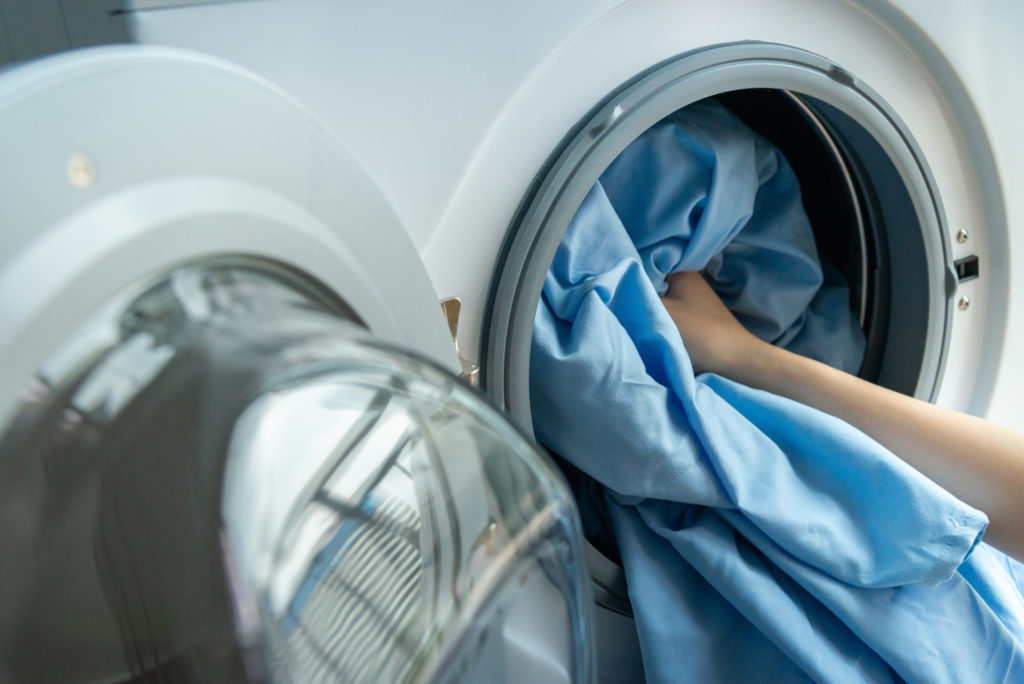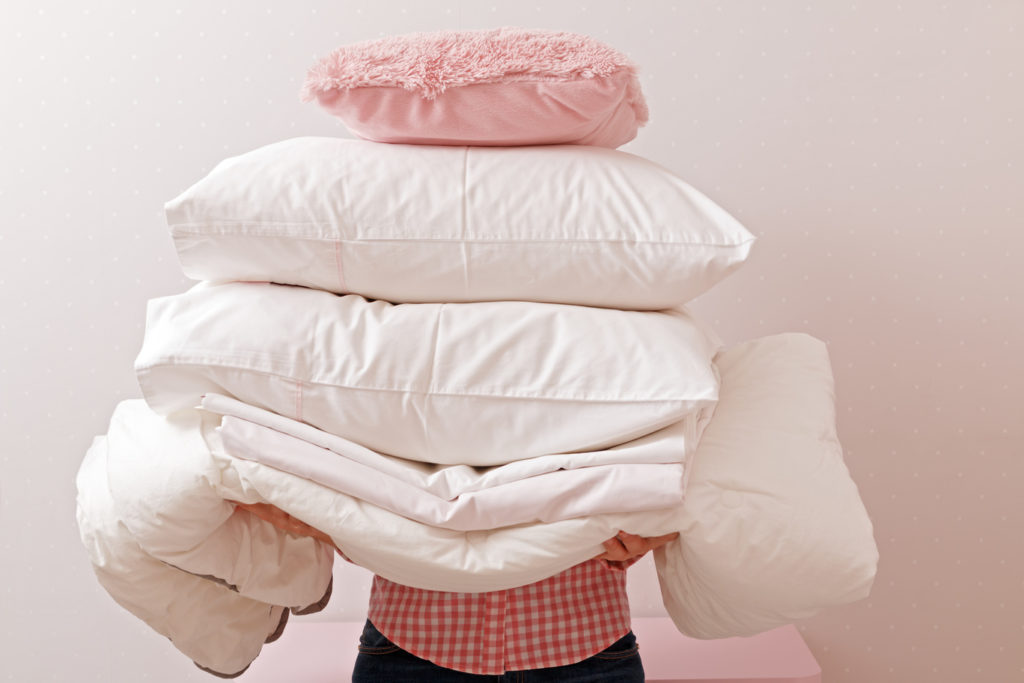You want your bed to be your own personal refuge- a place for good sleep and pleasant dreams. It’s essential to keep your space fresh and clean. You may be asking yourself questions like:
- Can I wash pillows?
- Can you wash a comforter?
- What detergent should I use for pillows and comforters?
Washing a Comforter and Pillows at Home
Your comforter and pillows are two items in your house that are used every day. Read on to find out how to keep them looking good and well-kept according to standards of bedding hygiene.
Can You Wash a Comforter Without Taking It to the Dry Cleaner?
The majority of comforters can be washed at home, but if you have a handmade or heirloom quilt, don’t put it in your washer. Delicate quilts like this are too fragile to be subjected to the action of your washing machine. For these quilts, you can either hand wash them or take them to the dry cleaner. Dry clean comforters that are precious to you to prolong their lifespan.
How Often Should You Wash Your Comforter?
Good Housekeeping recommends that comforters be washed with the change of seasons. Two or three times a year will keep your bed hygienic. You can keep your bed cover clean and reduce the number of washings needed by using a duvet with a duvet cover. It’s easier just to wash the duvet cover instead of washing a whole bedspread.
Washing a Comforter at Home
Begin by reading the label for washing information. You can wash your comforter at home if it fits in your washer. King-size comforters may require a trip to the laundromat.
Most comforters are made of washable cotton or a blend of cotton and polyester. Those that are made with silk or velvet shouldn’t get wet. You can do a test to make sure that it’s colorfast. Just wet a small area to see if the colors run.
Try to find the care label and wash according to directions—typically using warm to hot water. Dry your comforter on a low heat setting to avoid shrinking it. You can put a new tennis ball or dryer balls in the dryer. This will help prevent the filling from settling into an uneven distribution or clumping together. Alternatively, hang your comforter outside and let it air dry.

Can Pillows Be Washed?
So, can you wash pillows? Yes, most pillows can and should be washed. The only pillows that are not recommended to be washed are latex or memory foam and pillows filled with buckwheat hulls. For pillows that are not washable, you can spot-clean them and place them in direct sunlight for a few hours every 3-6 months.
You may be surprised to learn that you can wash feather or down pillows, as well as those made of synthetic down or polyester.
- For down pillows, it’s recommended to use a special detergent that’s designed for washing down so that the feathers don’t get sticky and clump. You can put them in the washing machine and run them on the setting for a gentle or delicates cycle.
- Synthetic down pillows can be washed in the same way.
- Polyester pillows should be washed in warm water and also cleaned on the delicate setting.
How Often Should Pillows Be Washed?
Most people aren’t sure if pillows can be washed or how to clean pillows.
If you are good at regularly washing your pillowcase, your pillow can be washed every six months. Use a pillow cover in addition to a pillowcase. You can wash the pillow cover with your regular wash as often as you like.
People who have allergic conditions will benefit from washing their pillows every three months.
The Best Way to Wash Pillows at Home
Most pillows can be washed at home. A few types of pillows are supposed to be dry cleaned as a necessity. If your pillow still has the label, follow the care instructions.
When you wash your pillow in the washing machine, the pillow’s contents get soaked through. This is why drying your pillows the right way is critical to avoid a lumpy pillow. Follow these tips for washing pillows:
- Try to wash two pillows at once to have a balanced load.
- Always wash your pillow on the gentle or delicate cycle.
- Use as little detergent as possible—just a tablespoon of liquid detergent is usually plenty for two pillows.
- Don’t use a fabric softener because it can deposit residue and cause uncomfortable lumps.

Other Tips for Washing and Cleaning Bedding
- Powder detergents can be difficult to rinse off. Running an extra rinse cycle can remove any lingering detergent on your comforter or pillow. Spot treat any stains and repair tears before washing your bedding.
- When drying pillows, avoid using a smart-dryer setting because these depend on surface moisture readings and pillows dry on the outside before being completely dry inside.
- Use air-dry only (no heat) for down and feather pillows. These are prone to heat damage, and if overheated, they can singe, which can leave a permanent odor.
How Often Should You Wash Your Pillow?
Using and washing a pillowcase or pillow cover can reduce the build-up of allergens, but without regular cleaning, your pillow will harbor dust, dust mites and their droppings, and minute particles of dead skin, and other debris.
If you use a pillowcase or cover and launder it frequently, washing your pillow every six months (or when visibly soiled) is often enough to keep your pillow healthy and clean. People with dust mite allergies, asthma, or infirmities may want to wash their pillows every three months.
Most pillows can be washed at home. To find out if your pillow needs dry cleaning, read the label instructions. (If you’ve cut off the label and thrown it away, instructions may be available on the manufacturer’s website.) The label should also include any other special instructions for washing.
Your pillow’s fill material is the most important thing to consider when planning how to wash it. Synthetic down and polyester can both be dried on low to moderate heat. However, drying on lower temperatures for longer is safest.
Regular washing of your bedding will make your bed more enjoyable and may lead to better sleep.


